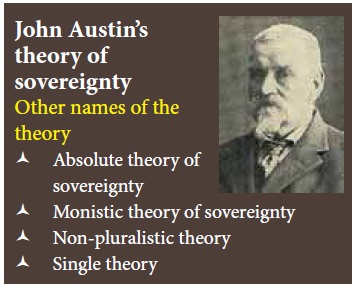Chapter: 11th Political Science : Chapter 3 : Basic Concepts of Political Science
What is Pluralism?
What is Pluralism?
Pluralism is a powerful protest against the
monistic theory of sovereignty, which endows the state with supreme and
unlimited power. The pluralistic theory originated in the writings of Otto
V. Gierke. The pluralist challenges the claims of the state to
supremacy on the ground that the society consists of many associations and the
state is one among them. Hence, the state cannot be endowed with sovereign
power of the community. There exists many social, political, cultural and
economic institutions in society and many of these institutions are prior to
the state. For example, Family and church are prior to the state.
Exponents of pluralist theory
v Harold J. Laski
v J.N. Figgis
v Ernest Barker
v G.H Cole
v Maciver
The dawn of pluralist theory
In democracy, the authority of the ruler is
confined, the cabinet becomes more powerful but the state remains sovereign and
supreme. With the advent of the welfare state there came a rapid increase in
the functions of the state and there remained no sphere of life with which the state did not interfere,
the sovereign and the supreme state also faced revolt and reaction. This
reaction against the sovereign and supreme state resulted into the dawn of
pluralism.

Is Pluralism important?
v Pluralism upholds the importance of associations and claim more autonomy for it.
v For democracy to flourish the sovereign state must not be subject to any legal authority.
![]() v Division of
sovereignty leads to the destruction of sovereignty and in the absence of sovereignty,
anarchy will prevail in society.
v Division of
sovereignty leads to the destruction of sovereignty and in the absence of sovereignty,
anarchy will prevail in society.
What are the criticisms for Pluralism?
v Itis the Sovereign state that brings about unity and regulates all the associations existing in
society.
v Laws are framed by the state unlike the belief of pluralist.
v State is needed for protecting people from the excess of associations.
Related Topics